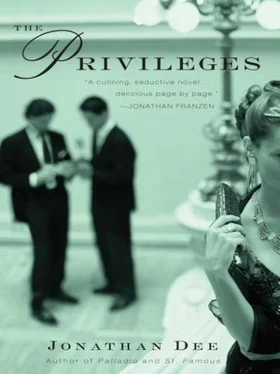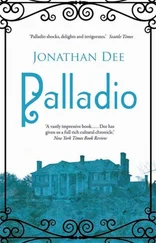So as bad off as he was, it was agony for her to watch him slip even farther. In his sleep his breathing degraded into a terrible sort of rasp: she’d heard the phrase “death rattle” before and at first assumed that this was it, but then maybe not, because he woke up again. He hadn’t spoken in a day. She took over from the nurse the task of balming his lips, which were cracked all the time, because he no longer had the wherewithal even to lick them.
Still, when she would start awake in the chair by the head of his bed, or when she would rush in from the veranda overlooking the phony lake because she thought she’d heard a noise, she tortured herself with the thought that he had said something and she’d missed it.
She stopped going back to the hotel. She called the front desk to make sure Herman would continue on a 24/7 retainer, with whatever increase in pay that necessitated. It was silly but without Herman she was cut off from everything else she knew. She had no idea where the hell she was. On the other hand, maybe Marilyn the nurse could give her a ride somewhere if she needed it. Maybe they’d even have to stop off at Marilyn’s home first, on their way to wherever they were going, so Cynthia might get a glimpse of how such people lived.
Time had shrunk down to the point where its only unit of measure was each irregular breath. One night, or day, she woke up in the chair and found him staring right at her. “Sinbad?” he said. His skin was drawn taut around his skull, but the film that seemed to lay across his eyes most of the time was gone.
She sat forward. He seemed a little sweaty; she dampened the washcloth and gently patted his forehead, his temples, his cheeks. “That’s nice,” he said clearly.
Bright institutional light slanted in from the open doorway; only by looking through the half-closed louvers could she see that it was dawn. Unless that was dusk. Either way, it cast the empty lake and the man-made berm beyond it in shades of the same blue.
“Don’t cry,” her father said. But she wasn’t crying. She even put her fingers to her face to make sure. “I’m not crying, Dad,” she said to him, and smiled.
“There, there,” he said. He was looking right at her. “Take it easy. I’m right here.”
Why should her first reaction, when he would stray like this, be to try to correct him, to bring him back into the moment? What difference did it make anymore, as long as he wasn’t mad or agitated or looking for the goddamn shoes he was never going to put on again?
“Okay, Dad,” she said. “Thanks. I feel better now.”
“Good. We probably have to get to the church pretty soon. Don’t we?”
Cynthia felt his delusion pulling at her like a drowning person might pull at your ankle from under the water. What was it? He couldn’t possibly be talking about his own funeral?
“What time is it?” he asked her.
She shook her head, but she couldn’t be sure he saw, so she cleared her throat and spoke. “I don’t know,” she said.
“Well,” he said, with a bit of a rasp now, “I’m sure we have a few minutes. They can’t very well start without us, can they?”
She held the cup to his mouth and he took a sip of water. Some of it ran down his cheek, and she reached out and stopped it with her fingers before it reached the pillow.
The way to stay with him, if you didn’t understand exactly where he’d gone, was to eliminate the backdrop of time and place, forget about it, let it fade away, so that it was just the two of you standing against a blankness. So that there was only the present. This was what the two of them knew that no one else had ever understood. Everyone always wanted to know how she could forgive him, but forgiveness was a false premise. The whole idea of forgiveness presumed you were locked in the past and trying to let yourself out. She wasn’t going to drag him back in that direction, to make him explain why he’d lived as he’d lived. That wasn’t who they were. Each moment bore only on the next one and if you were going to be successful in this life, that was the plane on which you had to live. If you started going on your knees to the past, demanding something from it that it hadn’t given you the first time around, you were dead. She asked for nothing from it. Neither did he. She was proud of his lifelong refusal to give in to the pathetic narcissism of depression or remorse. He had done what he had done and there was no changing it. There was no going back. She leaned over until her mouth was close to his ear.
“I’m so tired,” she said. “Is it okay if I lie down with you here while we’re waiting?”
He stared at her, every muscle in his face gone slack; his left hand spasmed a bit, and she recognized that what he was trying to do, or thought he was doing, was patting the bed beside him.
She still didn’t know how those rails worked, so she had to climb over as if it were a fence and drop down beside him as gently as she could. She curled up with her back to him on top of the comforter, which didn’t smell that great, and listened to his even, shallow breathing. She didn’t move; he was so frail that she was afraid of hurting him. “This is your day,” she heard him say. “It’s all in front of you. What a gift to be young.” Some hours later she felt a hand on her shoulder; it was a nurse, one she hadn’t seen before, trying to wake her as gently as possible, and before she had even lifted her head she could tell from the look on the woman’s face that her father, whose weight she could still feel on the bed behind her, was gone.
What had he come here looking for? It was all forgotten now. He had a vision of himself trying to explain all this to someone — what he was doing there in the first place, what he had expected to find, and not to Nikki or Agnew either but to a total stranger who didn’t know who he was — and he felt nothing but that stranger’s disgust for the folly of it. It was all so trumped up. He had invented it for himself. It was like there was no actual heart of darkness anymore and so he had to go and build one up out of nothing, and he had done such a good job of it that maybe now he was really going to die here and wind up as just another element of the overpowering stench in which Novak somehow managed to live.
And where was that Stockholm-syndrome thing you heard about? All he felt for Novak — whom he had romanticized into a figure who suffered for his art and for his noncompliance with the jaded world and its corrosive history — was an instinctive homicidal hatred, as he would for an animal that threatened him. The guy was balls-out insane and that was all there was to it: what difference did it make, to him or to anyone else, if his drawings hung in museums or if he just drew with his own shit on the walls of some madhouse?
Novak mumbled to himself as he worked. The wall was about eight feet by eleven feet. Like a giant piece of paper, was maybe how it presented itself to him. He covered every inch of it. Horror vacui— the phrase popped into Jonas’s head, a phrase he’d once had to ID on the final in Agnew’s Art Brut class. The wall was turning into a landscape of sorts, a flat, dimensionless one, full of those same gas stations and dead TVs: whatever it was he was trying to say with those few icons, he was apparently never going to get it said. A river ran across the picture, or maybe more of a canal, since it flowed straight as a board from one side of the wall to the other. A road made of water. All kinds of people and detritus were borne along in it, some aboard rafts or boats, some swimming or maybe drowning — the ambiguous open mouths of everyone in the picture made it impossible to tell. Novak worked the way a house painter might work, strictly in terms of space, from left to right; no figure seemed more important or more difficult to him than any other. It might have been his masterpiece; at the very least it was going to get him evicted. The strongest feeling Jonas could work up about it was fear of what would happen when it was finished.
Читать дальше












